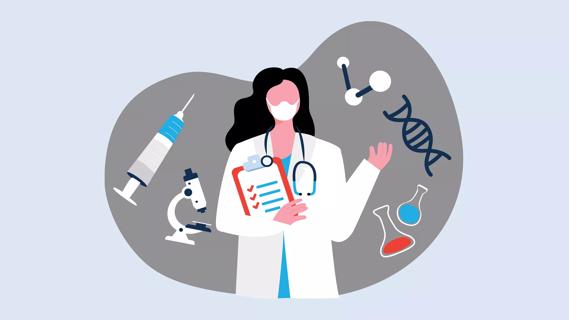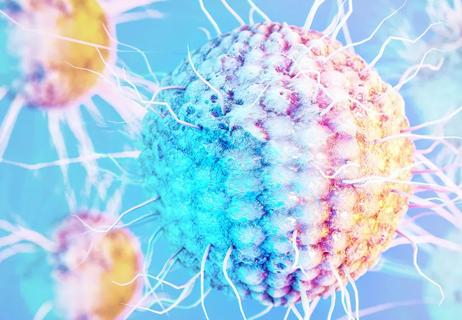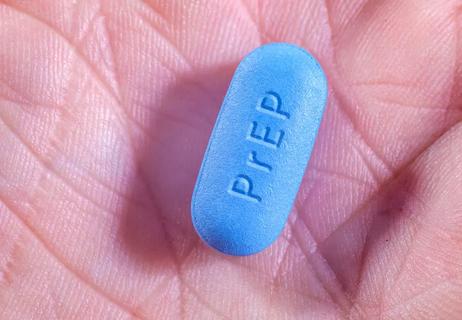A compromised immune system requires precaution

No one likes to get sick, but sometimes, it’s an inevitable outcome. That’s especially true for parents worried about their kids catching the latest cold circulating around school or daycare. But if someone is having serious, frequent infections or illnesses that require hospitalization or a higher level of care, their body’s immune system may be compromised or weakened.
Cleveland Clinic is a non-profit academic medical center. Advertising on our site helps support our mission. We do not endorse non-Cleveland Clinic products or services. Policy
Family medicine specialist Daniel Krajcik, DO, breaks down what it means to be immunocompromised and some common concerns people have.
Your immune system can function properly, be overactive or underactive. When your immune system is underactive, you have a compromised immune system, also known as an immunodeficiency.
You can think of your immune system as an internal network of bodyguards. This network is made up of white blood cells, skin cells, antibodies, lymph nodes, and other organs and tissues, like your spleen and bone marrow. They all work together to study, identify and destroy invaders (like bacteria, viruses and parasites) that cause infection and illness.
A properly functioning immune system will identify invaders the first time they make contact. If the network thinks those invaders are potential threats, your immune system will release signals that cause inflammation to prevent those invaders from reaching other areas of your body, while it works to destroy them.
If just one part of your immune system fails to do its job or underperforms, your entire immune system can be weakened or compromised. No bodyguards or fewer bodyguards means that your body is left open to more frequent or abnormal infections that can be more intense and difficult to treat.
“Our immune system has many different arms or parts to it,” says Dr. Krajcik. “Because of this, it can be hard to diagnose a compromised immune system.”
Conditions that cause compromised immune systems fall into two categories: primary immunodeficiencies and secondary immunodeficiencies.
All of us are born with an immune system that has a basic level of protection. This protection is known as your innate immunity and it lasts your entire lifetime. There are ways to strengthen your newborn baby’s innate immunity or offer toddlers a boost of protection. But sometimes, you can be born with a primary immunodeficiency disorder (PIDD), where a part or all of your immune system doesn’t work effectively enough.
Mutations, or changes, in your genetic code cause PIDD. While we don’t know every cause behind these mutations, PIDD can be hereditary and it happens to 1 in 1,200 people in the U.S.
“Primary immunodeficiencies are on a wide spectrum,” notes Dr. Krajcik. “Some types can be more serious, where you miss a whole functioning of cell lines in your immune system, and some people are born with partial functioning immune systems that may not even be noticeable until later in life.”
As you grow and get older, your immune system acquires new information and new ways of defending itself each time it comes face-to-face with new invaders. That means for each subsequent attack, it learns how to respond more effectively with a stronger, concentrated immune response.
Vaccines help strengthen your acquired immunity over time, but secondary immunodeficiencies can interrupt your immune system’s ability to learn, change and protect you from future infections by weakening specific parts of your immune system.
“Secondary immunodeficiencies are often acquired later in life as the result of certain conditions,” says Dr. Krajcik. “If you develop an infection that’s really atypical for you, that could be a sign of a secondary immunodeficiency.”
Some common causes for acquired secondary immunodeficiencies include:
The human immunodeficiency virus (HIV) weakens your immune system over time by destroying a specific kind of white blood cells called CD4 cells, or helper T-Cells. If HIV is left untreated, it can evolve into acquired immunodeficiency syndrome (AIDS) during its final stages.
Treatment consists of daily antiretroviral therapy (ART) medications that make HIV untransmittable and undetectable — meaning, it lowers the amount of HIV in your blood to such low levels that the virus can’t infect other people. Treatment also slows down HIV’s ability to weaken your own immune system.
“People who have well-controlled HIV might have a bit of a dampened immune system, but overall, their immune system can function very well because of how excellent and easily treatable our medications are these days for HIV,” states Dr. Krajcik.
Some kinds of cancer can affect the way your immune system works. For example, blood cancers like acute myeloid leukemia (AML), which begins in your bone marrow, directly affect your body’s ability to produce white blood cells, whose sole function is to fight off infection. Other blood cancers that weaken your immune system include:
Depending on the location, type and stage of your cancer, cancer treatments like chemotherapy, radiation therapy and targeted therapy can further suppress your immune system and weaken it for a period of time.
Immunotherapy, on the other hand, boosts different elements of your immune system so they can fight off cancer cells, and this kind of treatment is often used in combination with other cancer treatments.
You can think of autoimmune disorders like your body’s immune system going into autopilot mode. In an effort to protect you, your immune system can become confused and cause inflammation in certain organs. When your immune system is overactive, it can wrongfully target and damage healthy tissues, organs, cells and other innocent bystanders because it views them as potential threats.
Examples of autoimmune disorders include:
To stop your immune system from attacking other parts of your body, doctors will often prescribe immunosuppressants to reduce inflammation and lower your immune system’s overactivity to a more manageable level.
“Sometimes, medicines are needed to suppress the immune system because their immune system is attacking their own bodies,” explains Dr. Krajcik. “When people are on these medicines, they overall live healthy lives, but we need to monitor them closely because somebody with a compromised immune system may develop more serious infections.”
When you receive an organ transplant, your body’s immune system might try to reject the new organ because it recognizes it as a foreign invader. To avoid this, doctors might prescribe transplant medicines that suppress your immune system, so it doesn’t launch an attack. As long as you have your transplant, you’ll need to keep your immune system suppressed.
“People can become immunocompromised because they have to keep their immune system functioning at a very low level to ensure it doesn’t attack the organs they need to continue living,” says Dr. Krajcik.
People who are immunocompromised may experience infections more frequently. Sometimes, they can develop abnormal infections people wouldn’t develop with a functioning immune system. Other times, infections may take longer to work out of their system.
A compromised immune system may become apparent in adults when they’ve begun developing new or different patterns of infections and healing processes. You may have a compromised immune system if you experience:
But, you may be thinking, my kid gets sick all the time. Should I be worried?
The answer is a bit more nuanced.
“Kids get sick all the time, oftentimes, back-to-back. But if you notice children aren’t hitting their growth curves or milestones as they should for their age, or they have chronic diarrhea, these could be signs of something more serious going on beyond just frequent infections,” cautions Dr. Krajcik. “Frequent infections that take more than several days to recover or require hospitalization could be signs that their immune system isn’t fighting the infections as it would if they had a fully-functioning immune system.”
The goal is to treat the underlying cause of what’s compromising your immune system. Infusions, injection medications and antibiotics prescribed by an immunologist or allergist can also help make up for what your immune system is trying to do to protect against infections.
People who are immunocompromised need to be more vigilant in keeping up with vaccines, as they play a vital role in making sure even a weakened immune system is prepared against potential threats. That’s particularly true when you consider people who are immunocompromised are at higher risk for COVID-19 reinfection.
“Someone with a severely immunocompromised condition may need lots more vaccines than someone with even a mildly weakened immune system,” says Dr. Krajcik. “The vaccines that we have today we know are very safe and effective. By teaching our immune system to fight infections, we can help protect ourselves and those around us who might be immunocompromised.”
People who are immunocompromised may have adverse reactions to some vaccines, specifically live vaccines that introduce a live virus to your immune system. Some of the vaccines that should be avoided if you’re immunocompromised include:
But overall, if you’re immunocompromised, your healthcare provider can help determine which vaccines you should have and continue to revisit during the course of your treatment and beyond.
The unique nature of our immune systems means that not every immune system responds, reacts or functions in quite the same way. So, it’s important to continue having conversations with your doctor about your condition and any new changes or developments you’re experiencing.
Learn more about our editorial process.

The answer varies from person to person and vaccine to vaccine

PFAS chemicals that make life easier aren’t always so easy on the human body

The autoimmune protocol diet is designed to help identify inflammatory triggers

It’s not just smoking and genetics that can increase your risk of cancer

Managing the chronic pain of this autoimmune condition is important

This medication can significantly lower your risk of HIV

The link between joint pain and skin rashes

Contributing factors include racial disparities, high barriers to care and more

Your metabolism may torch 1,300 to 2,000 calories daily with no activity

A gentle touch in all the right places may help drain your sinuses